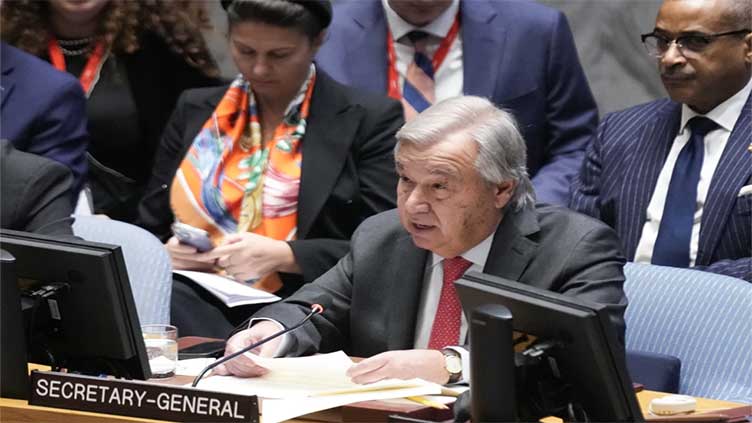UN Security Council is trying for a fifth time to adopt a resolution on the Israel-Hamas war

World
UN Security Council is trying for a fifth time to adopt a resolution on the Israel-Hamas war
UNITED NATIONS (AP) — After four failed attempts, the U.N. Security Council is trying for a fifth time to come up with a resolution on the Israel-Hamas war, but it remains to be seen whether serious divisions can be overcome to produce a consensus on wording.
The current draft under negotiation would demand “immediate extended humanitarian pauses” throughout the Gaza Strip to provide civilians with desperately needed aid. It also would demand that “all parties” comply with international humanitarian law that requires protection for civilians, calls for special protections for children, and bans hostage-taking.
But the draft, proposed by council member Malta and obtained Tuesday by The Associated Press, makes no mention of a ceasefire. It also doesn’t refer to Hamas’ surprise attack on Israel on Oct. 7 that killed around 1,200 people and took some 240 others hostage. Nor does it cite Israel’s retaliatory airstrikes and ground offensive in Hamas-ruled Gaza that the Gaza health ministry says has killed more than 11,000 Palestinians, two-thirds of them women and children.
Advertisement
The 15-member council, which has the responsibility for maintaining international peace and security, has been paralyzed since the war began by its internal divisions. This is especially the case between China and Russia, which want an immediate ceasefire, and the United States, Israel’s closest ally that has called for humanitarian pauses but objects to any mention of a ceasefire.
In the four previous tries, a Brazil-drafted resolution was vetoed by the United States, a U.S.-drafted resolution was vetoed by Russia and China, and two Russian-drafted resolutions failed to get the minimum nine “yes” voted needed for adoption.
Several council diplomats said the opposing sides were getting closer. Two said that a vote on the latest draft could come as early as Wednesday but that delegations were still checking with their capitals. The diplomats insisted on speaking anonymously because the negotiations are supposed to be private.
The resolution under consideration says the humanitarian pauses should be “for a sufficient number of days” to open corridors for unhindered access by U.N., Red Cross and other aid workers to get water, electricity, fuel, food and medical supplies to all those in need. It says the pauses also should allow repair of essential infrastructure and enable urgent rescue and recovery efforts.
After the failure of the fourth Security Council resolution, Arab nations turned to the 193-member General Assembly and succeeded in getting wide approval for a resolution calling for a “humanitarian truce” in Gaza meant to lead to a cessation of hostilities between Israel and Hamas.
It was the first United Nations response to the war. But unlike Security Council resolutions, General Assembly resolutions are not legally binding, though they are a barometer of world opinion.
The vote was 120-14 with 45 abstentions. Of the five veto-holding Security Council members, Russia, China and France voted in favor, the United States voted against and the United Kingdom abstained.
The General Assembly resolution was adopted Oct. 27 and Israel agreed Nov. 9 to four-hour pauses. But only very limited aid has been delivered to Gaza through the Rafah crossing from Egypt, and a humanitarian catastrophe has been brewing.
Richard Gowan, U.N. director for the International Crisis Group, said U.S. opposition to a ceasefire “is a gift that keeps on giving for Russia diplomatically.” He said that while many diplomats think Russia is demanding a ceasefire “for largely cynical reasons to make the Americans look bad,” Moscow’s position “is closer to the mainstream of council thinking, and the U.S. looks isolated.”
The irony is that the Security Council has called for ceasefires in wars from the Balkans to Syria “with little or no impact,” Gowan said.
“A U.N. ceasefire call would embarrass but not really constrain the Israelis,” he said. “But the U.S. clearly feels that even such a symbolic move is too much of a political risk.”


